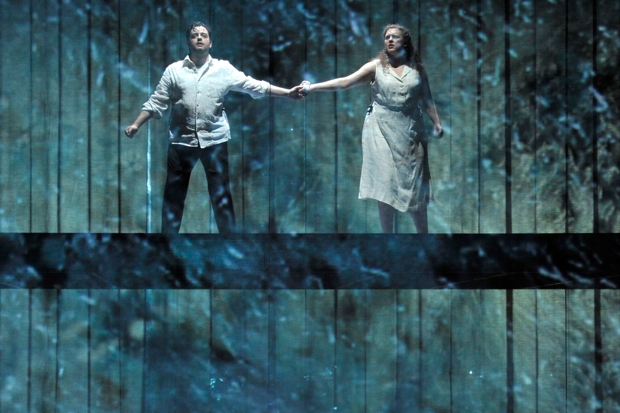I’ve been hoping that in this, the last of my weekly columns on opera, I would be able to strike a positive, even cheerful note on the present and future of the art form, but honesty compels me to say that I don’t think it is in very good shape. Not, probably, that it has ever been, or at least only for brief periods. Owing to its mongrel nature, there has usually been a tendency for one or other of its ingredients to lord it over the others, so that the ideal balance of music and drama, spectacle and action, personalised in the collaboration of singers and conductors, stage directors and musicians, has only been rarely achieved.
It is, of course, an inherently expensive art form, too, originally designed to celebrate the splendours of rulers and aristocrats, so that now, when it is unlikely that any rulers will want to attend one, stagings are often evidently economical, or, when lavish, largely financed by people who can’t afford to go to them, and almost certainly wouldn’t want to if they could. What with these and other factors, the result is that the grandest opera houses, where the better tickets are exorbitantly priced, are attended by people who want a good evening out, but are actually presented, as often as not, with what are often called ‘radical rethinkings’ of familiar or even not very familiar works, where the director has chosen to ‘deconstruct’ or ‘subvert’ the opera, so that instead of sitting there passively — this is the idea — the audience will be, in best Brechtian mode, forced to think rather than feel, to feel themselves ‘challenged’ rather than moved.
If this procedure worked, one would expect opera critics, who are exposed more often to these productions than anyone else, to be radical in their social and political views, to realise that what they spend so much of their time seeing and writing about is ensuring that they are unillusioned or even developing revolutionary tendencies. Observing the critics at fairly close quarters over 18 years, I have to say that this desirable result doesn’t seem to me to be forthcoming. The critics who most often praise the extreme deformations of operas effected by Calixto Bieito or Peter Konwitschny are more often, it seems to me, relieved to be seeing something different from traditional productions, with which they are bored, than spurred into fresh ideological thoughts and attitudes.
Last year had more than its fair share of ‘deconstructive’ productions, of which it would be hard to say which was the most outrageous, but to me it was Fidelio, a Bieito effort. No doubt Beethoven’s notion of Freedom is naive and simplistic, but it’s no good attempting to show that in a production of the work: it might need another opera, with a more sophisticated view, or a barrage of critical articles such as tend to appear in the programme books, but first of all we need to be exposed to the heroic action and music of Beethoven’s opera, without interpolations and outrageous deformations. English National Opera has committed itself to a policy of putting on these shockers, and The Magic Flute fared comparably badly. Even the year’s one undoubted success, its production of Berg’s Wozzeck, was overwhelming more thanks to the intensity of Edward Gardner’s conducting and the superlative acting than to a production that was unhelpfully and elaborately detailed.
The Royal Opera began the year deplorably with Kasper Holten’s production of Eugene Onegin, in which there was a silent actor and an impotent singer for the main roles, the result being confusion for the audience and, at least in the case of Simon Keenlyside in the title role, frustration that he wasn’t allowed to act the part. Wonderfully, the two greatest successes were the revival of Birtwistle’s The Minotaur, more confidently performed even than in its first run; and the UK première of George Benjamin’s Written on Skin, a puzzling work that nevertheless gave one the sense that it is very likely to be a masterpiece. And Wozzeck was lucky here too, with acting and music easily overpowering the twice-revived inane production. Much excitement was generated by La donna del lago, stunningly cast, but with a work that so few people know it seems perverse to produce it unintelligibly. The same goes for Verdi’s Les vêpres siciliennes, a grandiose bore, which received a lavish production that would need Tolstoy to pour adequate scorn on.
As always, I gained most pleasure from productions at the colleges of music, all of which are enterprising and usually uncorrupted by modishness, and from Opera North, though it hardly had a vintage year, and Welsh National Opera with its resplendent Lohengrin, one of the peaks of the Wagner celebrations, which were, all told, of an amazingly high standard — but then most of the greatest things were unstaged, at the Proms. Not being a driver, and unwilling to inflict too much punishment on my friends who are, I missed many of the country-house offerings, but the Longborough Ring has passed into operatic lore, though — to return to an earlier theme — it can only succeed thanks to the presence of an audience that would not agree with one of its messages, that the accumulation of capital is the root of a great deal of evil.
I shall be continuing to write a monthly column.






Comments